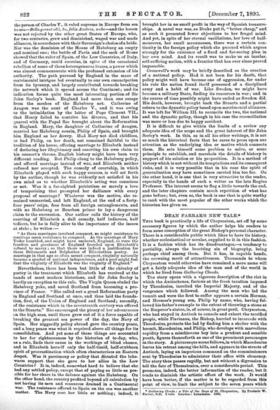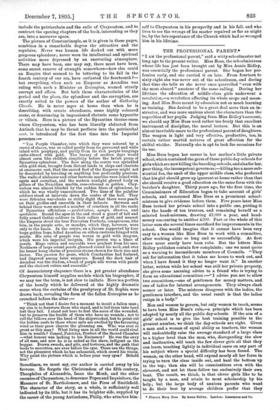DEAN FARRAR'S NEW TALE.* This book is practically a life
of Chrysostom, set off by some accessory figures by which the author helps his readers to form some conception of the great Bishop's personal character. There is a considerable public which likes to have its history, whether ecclesiastical or secular, supplied to it in this fashion. It is a fashion which has its disadvantages,—a tendency to partiality, always the besetting sin of biography, being perhaps chief among them. But it has, in capable hands, the crowning merit of attractiveness. Thousands to whom Chrysostom would otherwise have remained a mere name will get a fairly adequate idea of the man and of the world in which he lived from Gathering Clouds.
The story opens with a vigorous description of the riot in which the Antiochenes, furious at the fresh taxation imposed by Theodosius, insulted the Imperial Majesty, and of the vengeance which followed. Among the men who led the tumult and were the first to suffer appears a certain Hermes, and Hermas's young son, Philip by name, who, having fol- lowed his father's example to the extent of throwing a stone at the Emperor's statue, is, of course, in great peril. Chrysostom, who had stayed in Antioch to console and exhort the terrified people, while Flavianus, the Bishop, hurried to intercede with Theodosius, protects the lad by finding him a shelter with the hermit, Macedonins, and Philip, who develops with marvellous rapidity from a mischievous boy into a prudent and sensible youth, figures thenceforth as one of the prominent personages in the story. A picturesque scene follows, in which Macedonins leaves his retreat among the hills, and appears in the streets of Antioch, laying an imperious command on the commissioners sent by Theodosius to administer their office with clemency. The story thus passes rapidly, but not without a digression to tell the fate of Thessalonica, over a considerable period. This promotes, indeed, the better information of the reader, but it tends to diminish the artistic effect of the work. It would have been better, if the matter is to be regarded from this point of view, to limit the subject to the seven years which • Gathering antda a Tade of the Days of St. Chrysostom By Fredwrio W. Farrar. D.D. 2 rola London: Longmana. 1895.
include the patriarchate and the exile of Chrysostom, and to contract the opening chapters of the book, interesting as they are, into a narrower space.
The picture of Constantinople, as it is given in these pages, combines in a remarkable degree the attractive and the repulsive. Never was human life decked out with more gorgeous splendour ; never were its intellectual and spiritual activities more depressed by an enervating atmosphere. There may have been, one may say, there must have been, some secret reserve of strength somewhere—how else could an Empire that seemed to be tottering to its fall in the fourth century of our era, have outlasted the fourteenth F- but everything, when such an Emperor as Arcadius was ruling with such a Minister as Eutropius, seemed utterly corrupt and effete. But both these characteristics of the
period and the place, the splendour and the corruption, are exactly suited to the powers of the author of Gathering Clouds. He is never mpre at home than when he is describing, with ornate abundance, some highly coloured scene, or denouncing in impassioned rhetoric some hypocrite or villain. Here is a picture of the Byzantine throne-room where Chrysostom, who has been literally abducted from Antioch that he may be thrust perforce into the patriarchal seat, is introduced for the first time into the Imperial
presence :—
" The Purple Chamber, into which they were ushered by a crowd of slaves, was so called partly from its pavement and walls inlaid with porphyry, and partly from its rich purple hangings embroidered with gold. The luxury of modern days would almost seem like childish simplicity before the lavish pomp of Byzantine splendour. The floor along the centre was sprinkled with gold dust, brought from distant lands in ships and chariots at enormous cost, that the sacred feet of the Emperor might not be desecrated by treading on anything less profoundly precious. The walls of alabaster and other lustrous marbles were inlaid with agate and cornelian, and the eastern sunlight glowed hotly on pillars of the Numidian marble, rose-coloured or golden. Chry- sostom was almost blinded by the sudden blaze of splendour, to which he was wholly unaccustomed. Two lines of the palatine soldiers stood at intervals down the centre of the hall. They wore Sidonian war-cloaks so richly dight that there were pearls on their girdles and emeralds in their helmets. Between and behind them were massed a number of courtiers in all the ranks of Byzantine officialism —perfectissimi, egregii, illustres, and speetabiles. Round the apse at the end stood a guard of tall and fully armed Gothic soldiers in their collars of gold, and nearest the Emperor stood the four Prxtorian Prxfects, conspicuous, like him, in the purple robe, or mandye, which they, however, wore only to the knees. In the centre, on a throne supported by four huge golden lions, lolled Arculius on silken cushions fringed with pearls. His robe of purple was woven in gold with dragons, which were his imperial insignia. His person was a blaze of jewels. Huge rubies and emeralds were pendent from his ears. Necklaces of large orient pearls gleamed round his neck, and over his breast hung chains of precious stones chosen for their size and lustre. The passion for gems, which Constantine had fostered, had lingered among later emperors. Round the dark hair of Arcadius was the diadem, a band of purple silk woven with pearls and the choicest rubies and emeralds."
Of denunciatory eloquence there is a yet greater abundance Chrysostom himself supplies models which his biographer, if we may use the term, is not slow to imitate. Here is a portion of the homily which he delivered at the highly dramatic scene when the curtains of the presbytery of St. Sophia were drawn back, revealing the form of the fallen Eutropius as he crouched before the altar :—
"Think not that I desire for a moment to insult a fallen man ; my aim is to forewarn those who stand, and to bid them take heed lest they fall. I stand not here to fret the sores of the wounded, but to preserve the health of those who have no wounds ; not to roll the billows over the head of the shipwrecked, but to point out the hidden reefs to those whose sails are swelled by the favouring wind as their prow cleaves the gleaming sea. Who was ever so great as this man ? What living man in all the world could rival him in wealth ? Consul, Patrician, Priefect of the Sacred Chamber —what honour was lacking to his Eminence? He was the envy of all men, and now he is as naked as the slave, indigent as the beggar. Drawn swords, and pits, and tortures, and the path that leads to execution, are ever before his eyes. These are the things, not the pleasures which he has exhausted, which crowd his vision. Why paint the picture which is before your very eyes ? Behold him ! "
Sometimes, we must say, our author is carried away by his fervour. He forgets the Christendom of the fifth century, Theophilus of Alexandria, Isaacs the Monk, and the other enemies of Chrysostom, to denounce Popes and Inquisitors, the Massacre of St. Bartholomew, and the Fires of Smithfield. The character of the story, as a whole, is sufficiently well indicated by its title, but it has its brighter side, supplied by the career of the young Antiochane, Philip, who attaches him- self to Chrysostom in his prosperity and in his fall, and who lives to see the wrongs of his master repaired as far as might be, by the late repentance of the Church which had so wronged him in his lifetime.























































 Previous page
Previous page